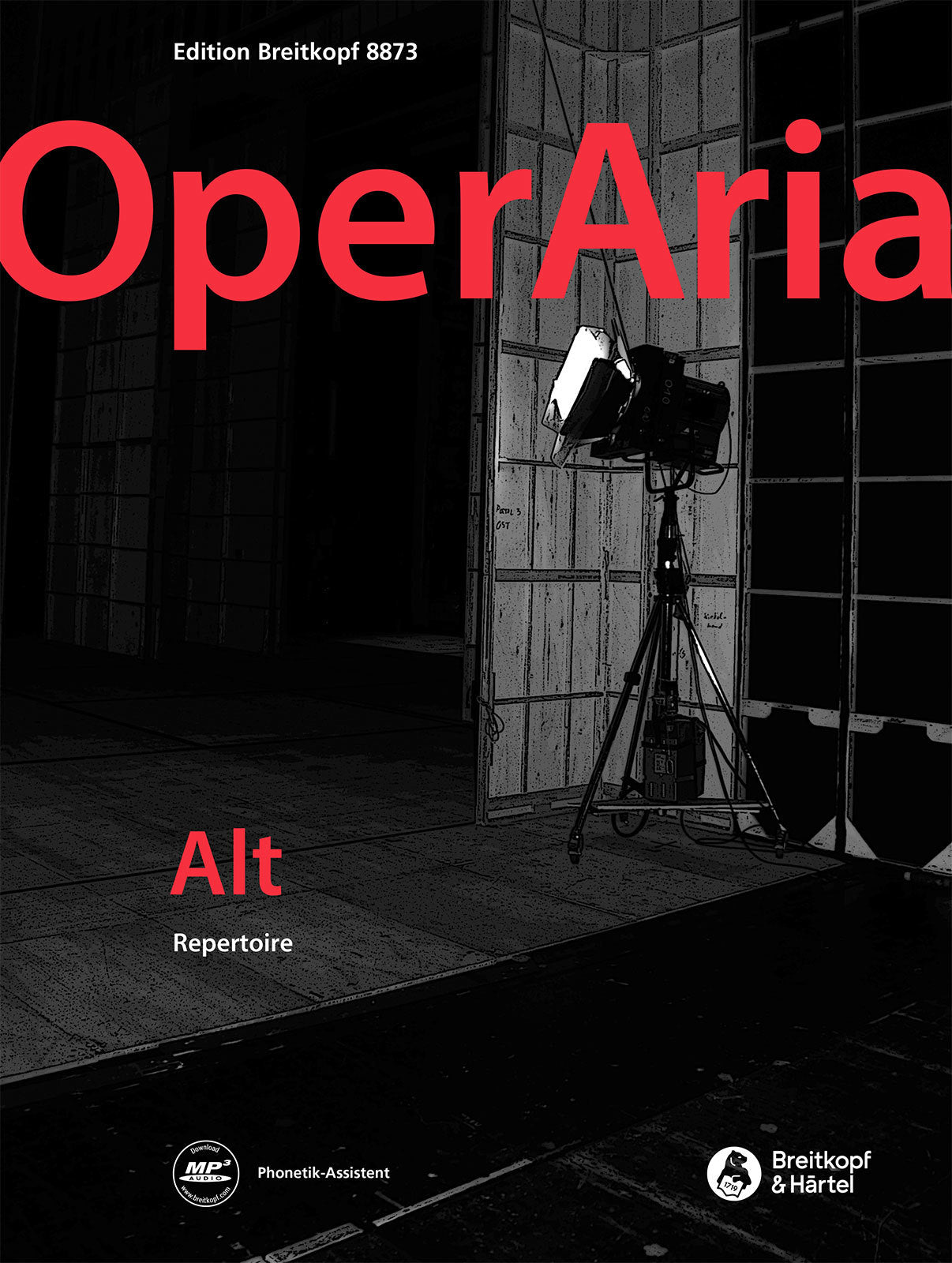OperAria Alto
In stock and typically ships within 1 business day.
- Composers: Modest Mussorgsky (1839-1881), Camille Saint-Saëns (1835-1921), Otto Nicolai (1810-1849), Wolfgang Amadeus Mozart (1756-1791), Richard Strauss (1864-1949), Wilhelm Kienzl (1857-1941), Giuseppe Verdi (1813-1901), Giacomo Meyerbeer (1791-1864), Claude Debussy (1862-1918), Aribert Reimann (1936-2024), Richard Wagner (1813-1883), Pyotr Ilyich Tchaikovsky (1840-1893), Gioachino Rossini (1792-1862), Amilcare Ponchielli (1834-1886), Igor Stravinsky (1882-1971), Christoph Willibald Gluck (1714-1787)
- Editors: Peter Anton Ling, Marina Sandel
- Format: Vocal Score
- Instrumentation (this edition): Piano Reduction, Alto
- Originally for: Opera
- Work Language: German
- ISMN:
- Size: 9.1 x 12.0 inches
- Pages: 144
Listen on Soundcloud
Description
"Our goal is to give the user a modern-day, systematically structured vocal coach who satisfies the demands of present-day theater practice. At long last a consistent repertoire and a well-ordered conflation of respective audition arias for all vocal genres." (Peter Anton Ling and Marina Sandel, editors)
Works:
- Gluck: Ahimè! Dove trascorsi? / Che farò senza Euridice from Orfeo ed Euridice (Italian Version), Wq. 30
- Mozart: Va, l’error mio palesa from Mitridate, Re di Ponto, K. 87 (74a)
- Mozart: Ah giacché son tradito / Son reo from Mitridate, Re di Ponto, K. 87 (74a)
- Mozart: Perché tacer degg’io? / Cara, lontano ancora from Ascanio in Alba, K. 111
- Meyerbeer: Ah ! mon fils from Le prophète
- Rossini: Ah! quel giorno ognor rammento from Semiramide
- Rossini: In sì barbara sciagura from Semiramide
- Rossini: Cruda sorte! from L'Italiana in Algeri
- Rossini: Mura felici / Oh quante lagrime from La donna del lago
- O. Nicolai: Ballade vom Jäger Herne from Die lustige Weiber von Windsor (The Merry Wives of Windsor)
- Wagner: Weiche, Wotan, weiche! from Das Rheingold, WWV 86a
- Wagner: Höre mit Sinn from Götterdämmerung, WWV 86D
- Verdi: Re dell’abisso affrettati from Un ballo in maschera (A Masked Ball)
- Ponchielli: Voce di donna from La Gioconda
- Saint-Saëns: Samson, recherchant ma présence from Samson and Delilah, Op. 47
- Saint-Saëns: Mon cœur s’ouvre à ta voix from Samson and Delilah, Op. 47
- Mussorgsky: Gadan’e from Khovanshchina (Хованщина)
- Tchaikovsky: Ach, Tanja, Tanja! from Yevgeny Onegin (Eugene Onegin), ČW 5, Op. 24
- Kienzl: Johannes schläft from Der Evangelimann
- Debussy: Voici ce qu’il écrit à son frère Pelléas from Pelléas et Mélisande, CD 93, L 88
- Strauss: Daphne! Wir warten dein from Daphne, TrV 272, Op. 82
- Stravinsky: As I was saying from The Rake's Progress (1951)
- Reimann: Was für ein Lärm from Bernarda Albas Haus
Publishers use a lot of words to describe what they sell, and we know it can be confusing. We've tried to be as clear as possible to make sure you get exactly what you are looking for. Below are descriptions of the terms that we use to describe the various formats that music often comes in.
Choral Score
A score for vocalists that only contains the vocal lines. The instrumental parts are not there for reference. Generally, cheaper than a vocal score and requires multiple copies for purchase.
Facsimile
Reproductions of the original hand-written scores from the composer.
Full Score
For ensemble music, this indicates that the edition contains all parts on a single system (there are not separate parts for each player). In larger ensembles, this is for the conductor.
Hardcover
Hardbound. Generally either linen-covered or half-leather.
Orchestral Parts
Similar to a wind set, this is a collection of parts. In the case of strings, the numbers listed are the number of copies included, though generally these are available individually (often with minimum quantities required).
Paperback
When publishers offer multiple bindings (e.g. hardcover) or study scores, this is the "standard" version. If you're planning to play the music, this is probably what you want.
Performance / Playing Score
A score of the music containing all parts on one system, intended for players to share. There are not separate parts for each player.
Set of Parts
For ensemble music, this indicates that there are separate individual parts for each player.
Solo Part with Piano Reduction
For solo pieces with orchestra, this is a version that contains a piano reduction of the orchestra parts. For piano pieces, two copies are typically needed for performance.
Study Score
A small (think choral size) copy of the complete score meant for studying, and not playing. They make great add-ons when learning concertos and small chamber works.
Vocal Score
A score prepared for vocalists that includes the piano/organ part or a reduction of the instrumental parts.
Wind Set
For orchestral music, this is a collection of wind and percussion parts. The specific quantities of each instrument are notated.
With Audio
In addition to the printed music, the edition contains recordings of the pieces. This may be an included CD, or access to files on the internet.
With / Without Fingering (Markings)
Some publishers prepare two copies - a pure Urtext edition that includes no fingering (or bowing) suggestions and a lightly edited version that includes a minimal number of editorial markings.



